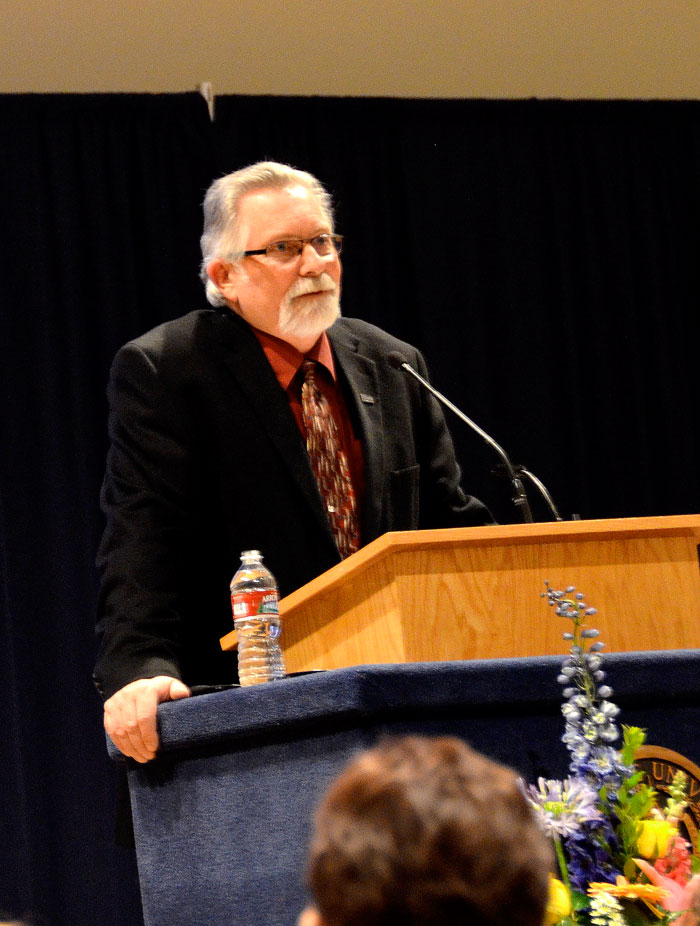Advice from ‘Last Lecture’: connect with others to build civil society
April 6th, 2012 Posted in OpinionLOGAN—If College of Humanities and Social Sciences Dean John C. Allen were to leave campus with only one last lecture, his chosen words to students would be to build a successful community by treating others with respect; community creates the success or failure of a civil society, he says.
 USU Honors students selected Allen, a rural sociologist, to deliver this year’s 37th annual Last Lecture on Wednesday. “A civil society allows us to begin connecting,” Allen said. “It doesn’t take a PhD to figure that out.”
USU Honors students selected Allen, a rural sociologist, to deliver this year’s 37th annual Last Lecture on Wednesday. “A civil society allows us to begin connecting,” Allen said. “It doesn’t take a PhD to figure that out.”
One of the first lessons Allen says he learned about community is to personalize the way we see others.
“Sometimes, if we look at each other as human beings,” Allen said, “we will resolve some of the conflict that we face.”
Allen gave personal examples of distressed communities in which he has worked that, over time, learned how to work together successfully.
As a new PhD assistant professor in northern Maine, Allen learned that by creating personal relationships with people we disagree with, communities can overcome their differences—even communities sharply divided by economic status and violence.
Freshman Kenyon Smith agreed. “People don’t talk to each other as much as they used to,” Smith said. “You can learn a lot of things from talking to different people.”
In working on a Native American reservation and helping mediating a divided town of Native Americans and Dutch descendants, Allen learned that diversity is a key component in a successful community and civil society.
“When the whites and natives sat down and there was empathy and civility, they actually valued one another,” Allen said. “They got to talk to someone on the other side of all the pain and the hurt.”
Through all of these experiences and lessons Allen was able to reflect on why people were able to get along. One of the things he found that was through individual self-interest, the needs of society are not properly met.
“Even if I disagree with you, it’s OK for me to do something positive and not expect an immediate feedback,” Allen said. “I’m not against self-interest—it’s healthy. But it’s not the key component of creating a society that allows us to value one another and take other people’s perspective into consideration when we make decisions.”
However, another vital lesson learned over the years is that this level of change is not always going to happen in one big bite, Allen said. So how do you get there?
Allen provided students with a list of key mentalities required to reach a civil society.
1. Civil tone: Too many people believe that the way to get ahead is by using a loud voice and harsh language, but a civil tone allows understanding and clear thinking.
2. De-escalate: Tone it down—High emotions make it hard to relate to one another.
3. Personalize: Think about humanity and being a part of that. Then personalize it to individuals.
4. Meet the weirdos—Anyone who may be different from you. Value and respect differences, and bring new voices to the table.
5. Make connections: Act as a “welcome wagon” not only to those who are like you, but also those who are different.
6. Don’t be so pragmatic: Not everything can be planned and have a specific outcome. When we pick the ending before we start, Allen says, we’re not going to make it to a civil society.
7. Don’t have all the answers: Take it a piece at a time.
8. Look for new, innovative answers: Innovation does not emerge from just one individual, but from the input of many people with different ideas.
9. Enjoy it: Human interaction is exciting, tense and it changes us all.
Honors student Katie Wilde found Allen’s lecture very relatable. “I thought he did a really good job at keeping it on a level that I could understand and relate to,” Wilde said.
Allen is easy to follow because his passion for learning is similar to that of students, Honors sociology major Dalin Hansen said. “Dean Allen is learning with us … he was a student by our sides,” Hansen said. “And therein lies his passion.”
TP
Tags: John Allen, Last Lecture, USU Honors

Sorry, comments for this entry are closed at this time.